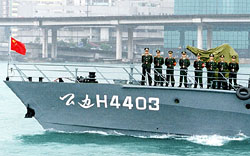



















 Guangdong Border Defence Bureau patrol vessel cruises into Hong Kong |
THREE mainland patrol vessels of the Guangdong Border Defence Bureau (BDB) sailed into Hong Kong waters for the first time ever on 11 June. Led by the Director of the Bureau, Lin Jie-yuan, the three vessels with 171 crew on board set off from Shekou in the morning, sailing past Tsing Ma Bridge and Kap Shui Mun before berthing at Hong Kong Marine Police Headquarters in Sai Wan Ho. |
|
"This historical visit turns a new page in the co-operation between Hong Kong and Guangdong marine police forces," said Regional Commander of Marine Police, Foo Tsun-kong, welcoming the officers. "Over the past few years we have been working successfully with the Guangdong Border Defence Bureau in the fight against cross sea-boundary crimes such as illegal immigration and smuggling. This visit will further boost our co-operation and mutual understanding in this area and help us do a better job." Responding, Director of Guangdong BDB, Lin Jie-yuan said: "This port of call is part of the exchange visit programme for the police forces of Guangdong and Hong Kong to visit each other. Police vessels of the Hong Kong Police Force will also be coming to Guangdong." Mr Lin said that both police forces had been strengthening the exchange of intelligence and co-operation to combat cross-boundary criminal activities, pointing out their first counter-illegal immigrant joint exercise in Mirs Bay prior to Hong Kong's change of sovereignty last year - which has since been followed by monthly intelligence meetings. "Under the 'One Country Two Systems' policy, mutual understanding and co-operation between the two police Forces continue to strengthen and enhance our work in many areas to the benefit of the social stability and economic development of both the Guangdong and Hong Kong regions. The Hong Kong Police Force is highly disciplined and well-equipped, and we continue to be impressed by their dedication, high calibre and professionalism," said Mr Lin. During their brief stay in Hong Kong, the party visited Commissioner of Police Hui Ki-on; DCP (Operations) Wong Tsan-kwong; Director of Operations Ng Ching-kwok; ACP (Operations) Yip Kwok-keung and other senior members of the Force. In addition, the mainland visitors toured Marine Police Headquarters, their training school and police launches. Officers of the Hong Kong Marine Police also toured the Guangdong Border Defence
Bureau's patrol vessels.
| |
A revised system for the Police Constable to Sergeant Promotion Exercise aims | |
 SSP Moderator and chairwoman of the Force Review Board Angela Lau Tse Kam-har --- determined not to let one rotten apple spoil the barrel |
AS part of the process of continuous development and
excellence in human resource management, the Hong Kong Police have introduced a revised system
for the Police Constable to Sergeant Promotion Exercise.
Incorporating recommendations made as a result of a broad review conducted by the Force as well as contributions suggested by the ICAC (upon invitation from the Commissioner of Police), this year's PC to Sergeant Promotion Exercise, which begins next month, includes major changes designed to ensure that it is fair, impartial and transparent, providing for consistent assessment on fixed criteria throughout the Force. |
|
The most fundamental change in the revised system of the PC to Sergeant Promotion Exercise is that of attitude. Both assessor and assessed are now being asked to take a more realistic approach to an extremely competitive undertaking. "Sergeant vacancies for 1999, to which this exercise is directed, are expected to be around 250. Last year there were over 3,000 candidates for about as many vacancies," said CSP Personnel Management Kevan Cooper. CONTINUES CSP Kevan Cooper: "Given the anticipated number of vacancies and the total number of candidates, it is incumbent to keep in mind the intent of this exercise - that of identifying only the best suited PCs to compete for promotion. Appraising and reviewing officers must adopt a realistic attitude and greater stringency in recommending only those candidates who are truly competitive when compared with others on a Forcewide basis." To ensure that happens, Divisional Commanders or their equivalents are now required to comment on a recommended candidate's suitability for promotion and put forward only those PCs who are seriously worthy and stand a chance of further consideration. The revised system also puts more onus on the candidates for self-assessment and to make a mature choice at the start of the exercise to decline recommendation for promotion to Sergeant if they don't feel they have a realistic chance of achieving promotion in that year. "Officers should not feel under pressure to go for a promotion they may not even want," said CSP Cooper. "Information as to the anticipated number of vacancies in the rank of Sergeant is clearly indicated in the administrative instructions which were published in both English and Chinese on the same day. PCs are now given the opportunity to declare in writing that they do not wish to be considered, and such a declaration will be recognised as being a mature decision with no negative connotations attached." The greatest fundamental change under the revised system (which is intended to level the playing field for all candidates) is the replacement of the Formation Assessment Boards (FABs), and the Force Promotion Board, by 15 independent Force Promotion Assessment Teams (FPATs) - overseen by a newly appointed Senior Superintendent Moderator and overall supervisor for the 1998-99 PC to Sergeant Promotion Exercise. SSP Moderator, Angela Lau Tse Kam-har, will chair the Force Review Board (which takes place following the recommendations made by the 15 FPATs) and is responsible for the implementation of Force directives concerning new policies and procedures for the selection of PCs for promotion to Sergeant. The new system is a one-step simple approach where all candidates recommended by their formations will undergo a fair, impartial and transparent centrally administered selection process designed to ensure that there is no conflict of interest and that a consistent standard is maintained at all stages. "In this new system, recommended Constables are no longer interviewed (or considered for promotion) by officers who command in the same formation, as was the case with the old Formation Assessment Boards," explained SSP Lau. Each of the new Force Promotion Assessment Teams is comprised of a superintendent and two chief inspectors from various formations who sit in 15 centralised locations and interview constables who do not come directly under their command. "The FPATs make it a more impartial, equitable system with no favouritism and great objectivity ensuring only the best officers become Sergeants," said SSP Lau. The primary function of the FPAT is to identify the strongest contenders for promotion from the group of candidates put forward by the formations. All FPATs will be briefed by the SSP Moderator before the commencement of their work - particularly on the paper board and the interview phases and to ensure that the same standards are applied by all the 15 FPATs across the board. The briefing includes selection skills training and input from an ICAC officer on corruption prevention. Said SSP Moderator Lau: "To sum up, officers of the 15 FPATs will look at recommended PCs, do a paper assessment of them, shortlist only the serious contenders, then interview those officers and make their recommendations to the Force Review Board." The Force Review Board (FRB), comprised of the SSP Moderator and two SPs, will conduct a final review of the FPAT's recommendations and assess the overall marks of all the candidates (who will not appear before the FRB) by means of a statistical equalisation using a recognised method known as "Standard Score". The SSP Moderator and the Force Review Board members will then review the paper board markings and submit a final list of the candidates along with the Board's recommendations to the Commissioner of Police for promotion from that list. "The Force has striven to ensure the complete openness of this new system and we think has succeeded in infusing it with sufficient checks and balances for any unlawful or corrupt activity to come to light and be swiftly dealt with. But you can never say any system is 100 per cent able to prevent those one or two rotten apples from trying to take advantage. In the end we are confident the new system will deliver what it's meant to - the highest calibre Sergeants possible under the fairest system available." The effectiveness of the revised system will be evaluated at the conclusion of the whole promotion exercise - which is a pilot exercise. A Steering Committee, chaired by the Director of Personnel and Training on JPO Promotion Systems, has been established to build upon these changes and consider future developments. | |

